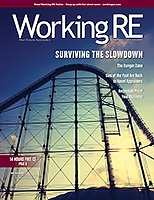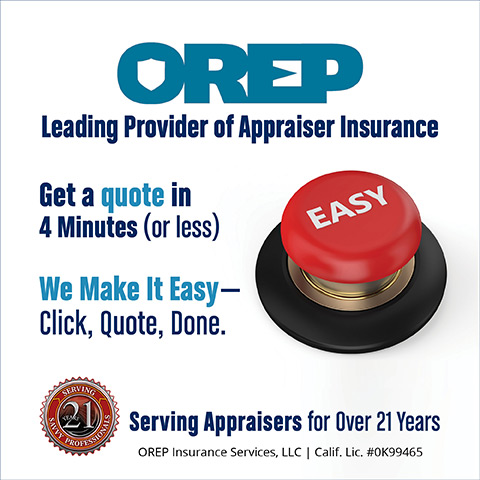 |
> The Appraiser Coach
> OREP E&O |
Recession Proof your Business using the Mindset Spectrum
by Kendra Budd, Editor
The pandemic is slowing down, along with the housing market—confronting appraisers with the reality that a recession is upon us and mortgage work is grinding to a halt. This looming scenario has left appraisers with one important question: How is my business going to survive?
To help answer that question, business coach, appraiser, and Chief Evangelist at True Footage, Blaine Feyen says it’s time for appraisers to study the mindset spectrum and discover where
they and their business fall on it. This spectrum is derived from the million-dollar mindset, which outlines opposing views—where the left side are negative traits and the right side are the positive ones you want to enlist in your business. Feyen believes your success is largely determined by your mindset, and your tenacity will be your greatest defense in recession proofing your business.
Having the wrong mindset can be disastrous for your business. In fact, you may believe you’re on the correct side of the spectrum, only to discover your mindset is askew.
Scarcity vs. Abundance
What makes a great appraiser stand out above the rest? Well, Feyen argues that part of it comes down to scarcity vs. abundance. Nowadays, it seems as if everyone is operating on the mindset that if someone has something, then you have no chance of obtaining the same thing—this is scarcity. Feyen explains that, “if you’re locked into the scarcity mindset where you believe there isn’t enough to go around, you’re going to have trouble growing and seeing opportunities.”
Basically, you’re too focused on what others have—you have to be the best otherwise you’re failing. But that mindset will only hinder you, not motivate you. Think of it this way: “If you were a professional boxer and you chose all of your opponents from an elementary school playground, you would think you were the best boxer in the world. In the last 10 years, everyone has been the best appraiser in the world by that standard,” says Feyen. Essentially, abundance can motivate you, because it also challenges you to do better.
A scarcity mindset is well on its way to taking over the appraiser industry because of the recession there will be less business. Feyen argues that simply isn’t true. “There is enough to go around. More pies can always be made. So, if I have a slice, it doesn’t take away from you getting a slice too. We can all grow and have enough.” Rather than focusing on bitterness, jealousy, and fear, appraisers should instead be focused on how to make the industry better as a whole—not just as an individual.
Past vs. Future
Business has two seasons, seed planting and harvesting. If you’re only harvesting, without continually planting seeds then nothing will grow. “We have been in a 10-year harvest, so what does that mean? No one has been seed planting. You have to plan for the future even when things are going great,” Feyen explains.
There are times when we get so stuck and wrapped up in our past that we neglect our future altogether. Feyen articulates how he sees this often in business, especially in the appraisal industry. This is because when someone is “past minded” they are using past information to dictate their future, rather than growing with new information as it arises. “Many people get stuck in the past, and have trouble growing due to prior information. Whereas someone who has a mindset on their future growth is more open to opportunities,” Feyen says.
(story continues below)
(story continues)
Transaction vs. Relationship
Often times, appraisers can view their clients as more of a commodity, and less as human beings. Feyen explains this a huge problem because, “If I were to commoditize an industry, the first thing I would do is make everything similar. My appraisal looks like yours, like his, like hers. I would reduce any perception of customer service.” This type of approach doesn’t make a client feel special in the slightest—so what would be the odds they’d refer you to a friend, or use you again? Slim.
Creating a strong relationship with a client is going to bring you a lot more referrals in the future, which is the best way to recession proof your business. Appraisers need to de-commoditize their business to see better success. Feyen articulates that those who practice the relationship mindset see more success because, “We’re focused more on the relationship that each transaction brings. We know the value of the client is far more important than the transaction.” A client can easily tell when they are just another transaction and that’s off-putting to them. “As humans, we are always seeking to be in communion and fellowship with other human beings,” says Feyen. If you’re not connecting with your clients, you might as well never count on them to come back to you—let alone give you a referral.
Security vs. Opportunity
Depending where you fall on this spectrum could potentially alter where you fall on the above mindsets. The security mindset is centered around staying safe, secure, and being constantly familiar of your surroundings. However, this mindset traps you into your current situation and leaves no room for growth. “The opportunity mindset focuses on a direction we’re unfamiliar with, where opportunity exists with willingness to step outside of our comfort zone,” says Feyen.
Without an opportunity mindset you can’t have a future, relationship, or abundance mindset either. Everyone should be focusing on opportunity, rather than safety and security. It can be daunting to take risks, but remember, there is always a reward within a risk.
Competition vs. Collaboration
The appraisal industry is one that can be highly competitive, but Feyen argues that it needs to change. “We think competition is a race to the bottom, one in which you’re always comparing yourself to somebody else or another company,” Feyen explains. This type of thinking is not only considered unhealthy, but it traps you in an endless exhausting cycle of self-doubt and jealousy. Wouldn’t you much rather work with another appraiser, than against them?
This is not to say we have to do away with all competitive aspects in the field; there is nothing wrong with trying to be the best at what you do—but it can end up hurting the appraisal business as a whole if you’re not willing to collaborate. Not only that, but how do you expect to learn anything new? “Collaboration says regardless of competitive aspects, there is always opportunity for collaborating with others. When you share with someone else, they share with you,” Feyen points out. Collaboration allows you to grow, whereas a competition mindset
stunts that growth.
Work Ethic vs. Wealth Ethic
There is nothing inherently wrong with being a hard worker, but when your whole mindset revolves around work ethic, then your business could be suffering. “The mindset revolves around the thought process of ‘the harder I work, the more I make.’ It locks us into the number of hours we have in the day, and the amount of energy we have to apply to those hours, and when we get exhausted, we’re done,” says Feyen. If that’s your sole focus, then you have to ask yourself what are you striving for? What is your end goal?
The wealth ethic doesn’t refer to learning how to make the most money by doing less work, but rather refers to the recognition of the concept of leverage. “We are always looking to create opportunity for new avenues of wealth and growth—not just for ourselves but others. It opens up the opportunity to bring in people to help, as opposed to it being all left up to you,” explains Feyen. Having a wealth ethic mindset helps you set goals, which motivates you to better yourself and your company. If you’re working for no reward then your work ethic will eventually burn out.
Hero vs. Trusted Advisor
We all have our own story, one in which we’re the main character or the hero—but in everyone else’s story you’re just a side character. Feyen says appraisers tend to have a hero-based mindset when it comes to client relationships. “The hero mindset refers to the idea that ‘I have to be the hero in the story for all my clients,'” Feyen iterates. However, the best thing for your client relationship is to actually be their guide, rather than their savior.
Think of it this way: every great hero usually had a teacher, or trusted advisor. Frodo had Gandalf, Spiderman had Uncle Ben, and Buffy had Giles—all tremendous heroes who wouldn’t have been able to succeed without the help of their advisor. That’s what you want to be for your client. Feyen explains, “The trusted advisor mindset says make your clients the hero—become the guide to their journey.” This allows your clients to feel more involved in the process of an appraisal, this leads to a better relationship, which leads to better referrals.
Cost vs. Investment
How many times have you found yourself arguing for the pennies instead of the dollars? Or how about how many times have you viewed people as merely a dollar sign in your business? If it’s often, then you have a cost mindset. This goes back to a transactional mindset, and many businesspeople view clients as ways to make their money. However, Feyen says that these clients need to not only be treated like individuals, but as investments rather than a dollar amount.
“People are not costs, they are investments. How can we help them grow? How can they help us extend our wealth and relationship opportunities?” By having an investment mindset, you are constantly thinking and enacting ways to better your business practices. Someone, even a client, can always help you grow by investing in their future.
Final Thoughts
As an appraiser, market changes are bringing a ton of new challenges your way. The United States is officially in a recession, and the mindset spectrum is a great example of what you should and shouldn’t be focused on when keeping your business afloat. It can be difficult to change your mindset when you’ve been so used to the same tactics for the past couple of years or even decades, but even just attempting to lean toward the right side can improve your business significantly.
The most important thing to remember during this time of uncertainty is your relationships with your clients, because they are the ones that keep your business running. Focus less on fear, money, and competition, and more on how your clients are feeling, and you will see great improvement in your business.
Stay safe out there!
About the Author
Kendra Budd is the Editor of Working RE Magazine and the Marketing Coordinator for OREP, a leading provider of appraiser E&O insurance—trusted by over 10,000 appraisers. She graduated with a BA in Theatre and English from Western Washington University, and with an MFA in Creative Writing from Full Sail University. She is currently based in Seattle, WA.
OREP Insurance Services, LLC. Calif. License #0K99465



